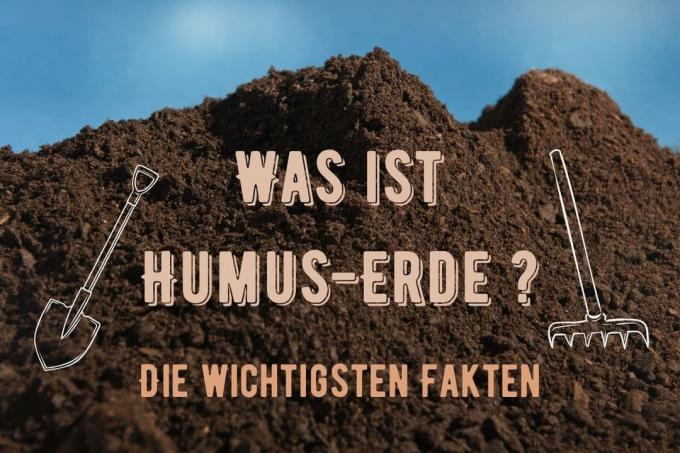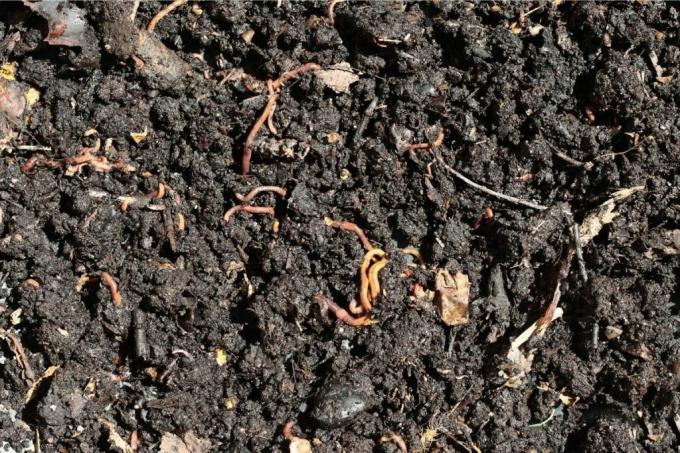
table of contents
- What is humus soil?
- properties
- Types of humus
- Humus earth and humus soil
- Signs of high quality earth
- frequently asked Questions
Humus soil or humus soil is an important prerequisite for strong and healthy plants to thrive. But what is humus? We explain it.
In a nutshell
- Humus is organic, dead material
- the substrate consists of one part each of humus and potting soil
- the term means translated roughly "earth"
- good humus soil can store a lot of water and large amounts of nutrients
- Humus soil has a pleasant smell and is slightly crumbly
What is humus soil?
Humus soil is a mixture that consists in equal parts of humus and potting soil. Humus itself is rotten, organic material. So compost serves as the basis for humus. This represents the top layer of the soil and is also created, for example, by leaves, dying plant parts, dried blades of grass and insects as well as microorganisms in the substrate.

properties
Humus soil has various positive properties. Including:
- pleasant smell
- fine, crumbly and loose structure
- high moisture content
- high nutritional content
Note: When choosing high-quality humus soil, care should be taken to ensure that it is peat-free. This protects the environment.
Types of humus
Humus is divided into several types.
-
Permanent humus: This form is the part of the substrate that is created in the final step of composting. It is the largest part of the upper layer of the earth and is responsible for binding nutrients and water.
-
Rubbish: This form of humus consists of substances that are easily and quickly decomposable. This includes, for example, leaves as well as vegetable and fruit scraps. Ground-digging insects feed on it and use this layer as a habitat.
-
Moder: Strictly speaking, mold is a combination of gauze and raw humus. It therefore combines the advantages of both substances and provides plants with sustainable nutrients.

- Nutritional humus: Similar to the gauze, these are substances that can be broken down and decomposed in a comparatively short time. They serve as food for the organisms in the soil, such as worms. On the one hand, the soil is very well ventilated and loosened due to its function as a source of food and the activity of the organisms. On the other hand, it forms the basis for the development and creation of permanent humus.
- Raw humus: The variant consists of organic materials that are difficult to decompose and only slowly decompose, such as twigs, branches and litter. Due to the slow running processes, the raw humus serves as a natural fertilizer in the long term, as nutrients are repeatedly released - and over a long period of time.
Humus earth and humus soil
The difference between soil with humus and a pure humus substrate lies in the exact composition. Mixtures that contain only a small amount of humus can also be referred to as humus soil. A real humus soil, on the other hand, consists of pure humus and several layers. Which is the better choice depends on the requirements of the respective plant.
Signs of high quality earth
A high quality one Substrate should meet some requirements so that it is the optimal basis for healthy growth. Knowing this helps when choosing ready-made soil from the trade, but it can also make it easier to put together your own substrate.
The factors are:

- a pleasant, fresh and subtle earthy smell
- slight humidity
- loose consistency
- organic substances with different times of rotting
- peat free
- different sized components
frequently asked Questions
The mining of peat is a heavy burden on the environment. In addition, the natural substance is an unsuitable choice for some crops. Good alternatives are coconut fibers or perlite.
In this case it should not be used. Well-laid out compost and the resulting humus only spread an intense and unpleasant smell if it is moldy, rotting or not yet completely rotted and therefore not suitable is.
Commercially available humus soil usually consists partly of potting soil and partly of humus. For plants that require particularly humus-rich soil, it is better to choose two parts of humus and one part of potting soil.
